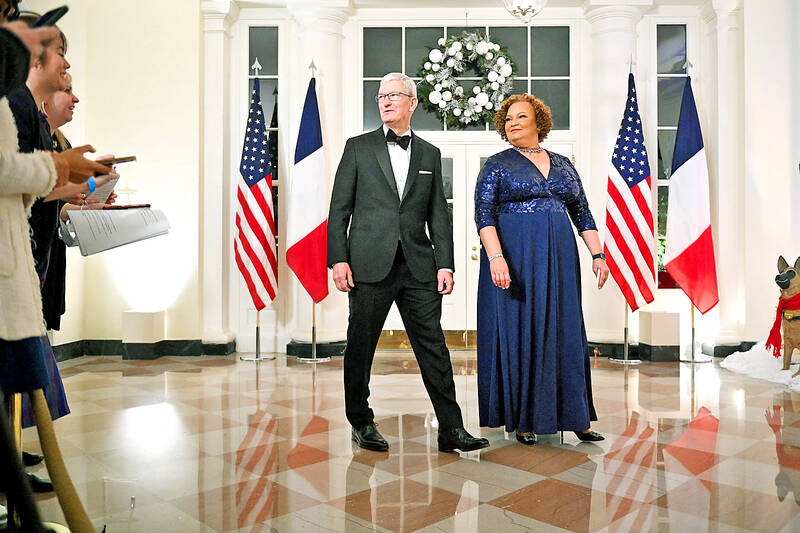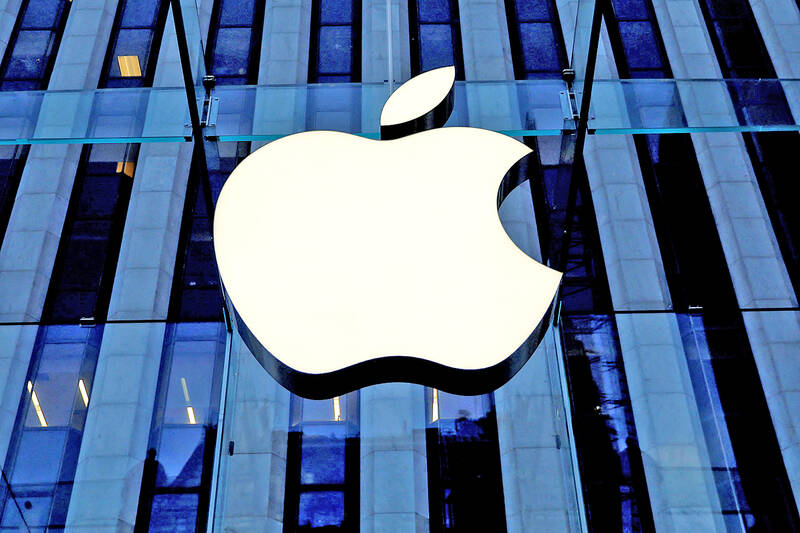Apple Inc is cutting CEO Tim Cook’s compensation by more than 40 percent to US$49 million this year, citing investor guidance and a request from Cook himself to adjust his pay.
As part of the changes, the percentage of stock units awarded to Cook and tied to Apple’s performance would increase to 75 percent this year from 50 percent, as well as in future years, the company said in a regulatory filing on Thursday.
Last year, Cook received compensation of US$99.4 million, including US$3 million in base salary, about US$83 million in stock awards and a bonus. That was up slightly from 2021, when his total pay package was US$98.7 million.

Photo: AFP
Cook’s latest pay was based on “balanced shareholder feedback, Apple’s exceptional performance and a recommendation from Mr. Cook,” the iPhone maker said in the filing.
The company also plans to “position Mr. Cook’s annual target compensation between the 80th and 90th percentiles relative to our primary peer group for future years,” Apple said.
Apple has drawn criticism from groups such as Institutional Shareholder Services (ISS) about Cook’s previous compensation package, but a majority of shareholders voted to approve it last year.

Photo: REUTERS
ISS, a top advisory firm, said that Cook’s stock would continue to vest post-retirement and that half of the rewards did not depend on performance criteria such as the company’s share price.
The US$49 million in target compensation includes the same US$3 million salary and US$6 million bonus as last year, as well as an equity award value of US$40 million.
His equity award value last year was US$75 million.
Cook’s actual total compensation for this year could fluctuate based on the company’s stock performance.
Cook, 62, has pledged to give away his wealth to charitable causes.
It is rare for CEOs to recommend their own compensation be docked. Pay packages have gotten increasingly lavish, and 2021 was a record year for executive compensation, Bloomberg data showed.
However, shareholders have increasingly pushed back on such packages.
A record number of so-called say-on-pay votes failed in 2021, which might have reflected shareholders’ frustrations with how companies performed during the COVID-19 pandemic, financial services company Mercer said.
Apple also disclosed last year’s compensation for chief financial officer Luca Maestri, general counsel Kate Adams, retail head Deirdre O’Brien and chief operating officer Jeff Williams. Those executives were all paid about US$27 million — including salary, stock and a bonus — last year, slight increases from the previous year.
The Cupertino, California-based technology giant also announced that its annual shareholder meeting would take place virtually on March 10.
Apple shares declined 27 percent last year, although that was less of a drop than the one posted by the tech-heavy NASDAQ Composite Index.
Apple shares have climbed 2.7 percent so far this year.

Nissan Motor Co has agreed to sell its global headquarters in Yokohama for ¥97 billion (US$630 million) to a group sponsored by Taiwanese autoparts maker Minth Group (敏實集團), as the struggling automaker seeks to shore up its financial position. The acquisition is led by a special purchase company managed by KJR Management Ltd, a Japanese real-estate unit of private equity giant KKR & Co, people familiar with the matter said. KJR said it would act as asset manager together with Mizuho Real Estate Management Co. Nissan is undergoing a broad cost-cutting campaign by eliminating jobs and shuttering plants as it grapples

PERSISTENT RUMORS: Nvidia’s CEO said the firm is not in talks to sell AI chips to China, but he would welcome a change in US policy barring the activity Nvidia Corp CEO Jensen Huang (黃仁勳) said his company is not in discussions to sell its Blackwell artificial intelligence (AI) chips to Chinese firms, waving off speculation it is trying to engineer a return to the world’s largest semiconductor market. Huang, who arrived in Taiwan yesterday ahead of meetings with longtime partner Taiwan Semiconductor Manufacturing Co (TSMC, 台積電), took the opportunity to clarify recent comments about the US-China AI race. The Nvidia head caused a stir in an interview this week with the Financial Times, in which he was quoted as saying “China will win” the AI race. Huang yesterday said

TEMPORARY TRUCE: China has made concessions to ease rare earth trade controls, among others, while Washington holds fire on a 100% tariff on all Chinese goods China is effectively suspending implementation of additional export controls on rare earth metals and terminating investigations targeting US companies in the semiconductor supply chain, the White House announced. The White House on Saturday issued a fact sheet outlining some details of the trade pact agreed to earlier in the week by US President Donald Trump and Chinese President Xi Jinping (習近平) that aimed to ease tensions between the world’s two largest economies. Under the deal, China is to issue general licenses valid for exports of rare earths, gallium, germanium, antimony and graphite “for the benefit of US end users and their suppliers

Dutch chipmaker Nexperia BV’s China unit yesterday said that it had established sufficient inventories of finished goods and works-in-progress, and that its supply chain remained secure and stable after its parent halted wafer supplies. The Dutch company suspended supplies of wafers to its Chinese assembly plant a week ago, calling it “a direct consequence of the local management’s recent failure to comply with the agreed contractual payment terms,” Reuters reported on Friday last week. Its China unit called Nexperia’s suspension “unilateral” and “extremely irresponsible,” adding that the Dutch parent’s claim about contractual payment was “misleading and highly deceptive,” according to a statement